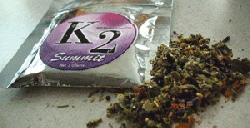LANSING – Synthetic marijuana branded with names like K2 and Spice has recently come under fire in the state of Michigan as more teens have been smoking the drug-like substances which has led to negative side effects that have included death, hospitalizations and even murder. Local communities and state legislators are quickly coming together to try and ban the substances, which can easily be found at gas stations and liquor stores for as cheap as $5 a packet.

|
| These substances have been known to have side effects similar to marijuana, while others note the effects could even be more heightened. |
The state Senate announced this week that it is quickly trying to adapt a new bill that will make the selling of these types of substances in retail stores illegal. An emergency meeting was called by the House Judicial Committee in Lansing in order to discuss ways that will advance the process of banning the substances as soon as possible.
Despite the state’s recent proactive measures, many local communities have taken action themselves to build awareness of the hazards of smoking the substances and have reached out to retailers demanding that they stop selling the products.
Most notable is Macomb County, which signed an emergency order this week prohibiting people from selling synthetic marijuana or substances that are similar. In total, the county has approved of three resolutions related to the substances, that could charge retailers with a misdemeanor as well as punishments that could include up to six months in jail if they chose to keep the products available in their stores.
The Wayne County Department of Public Health have also recently released a statement, calling it an “imminent danger order.”
“Wayne County is declaring an imminent danger to control the expanding problem of serious health effects associated with synthetic marijuana, and particularly its usage among young people,” Wayne County Executive Robert Ficano said in a press release.
Even within cities, regulations regarding the substances have gotten more strict. West Bloomfield Township announced that they will enforce a new ordinance this week that would hold anyone with the possession of these substances with misdemeanor charges as well as fines exceeding $500 or up to 90 days in jail.
Bloomfield Township would have a reason to act this strictly on the selling and possession of synthetic marijuana. Over the Memorial Day weekend, the city was taken aback by the sudden death of an 18-year-old male who had overdosed on the substance next to a private lake. This wasn’t the first tragedy in the city, just one week before that a 17-year-old male was shot to death by his grandmother who told authorities she feared that her grandchild was going to kill her in order to gain access to synthetic drugs.
It has also been revealed that the April death of Dearborn Public School employee Robert Cipriano was also related to synthetic marijuana use. Cipriano was beaten along with his wife and son by his other 19-year-old son Tucker Cipriano and his friend Mitchell Young outside of their Farmington Hills home. It was later revealed that both males had been frequent users of the substances and were looking for cash in order to get more in their possession.
These substances have been known to have side effects similar to marijuana, while others note the effects could even be more heightened. They include a rapid increase in the heart rate, vomiting, agitation, paranoia and hallucinating according to a recent report released by the Michigan Department of Community Health.
These side effects occur because the companies that make the substances spray the ingredients with chemicals that give off the same effect as Tetrahydrocannabinol, the main ingredient found in marijuana. While these ingredients are listed on the packets of the substances, a recent study has found that when dissecting the synthetics, there were still unknown ingredients that were not listed by the companies.
Despite both the state and counties taking proactive measures to ban the substances, they are still being sold at many local stores. The city of Dearborn for example has started to deal with the issue by asking owners of liquor stores, gas stations and tobacco shops to refuse to sell the products.
“We are sending out letters to ask store owners to voluntarily remove these dangerous products off the shelves immediately,” stated Police Chief Ron Haddad. “We’ve also reached out to all the local chamber of commerce’s and business associations asking them for their support in the matter. And lastly, we are working with our city law department to review our ordinances so we can better deal with this,” he added, noting that residents within the city could potentially be charged if they are found with possession of the substances.
Store owners aren’t only hearing it from Dearborn. The Association of Food and Petroleum Dealers (AFPD), an organization that represents over 4,000 independent retailers in both Michigan and Ohio has also asked its members to immediately stop selling the products.
“We are asking all members and non-members to stop selling this product immediately,” said Auday Arabo, president and CEO of AFPD. “Our members run family-owned business and the affect this drug has on our community is unacceptable. If anyone sees a store owner selling this product, call AFPD and we will meet with him or her to insist the product is removed immediately.”
If locals would like to report stores that still carry the products to the AFPD, the number to call is 1.800.666.6233.






Leave a Reply